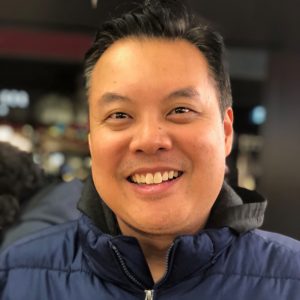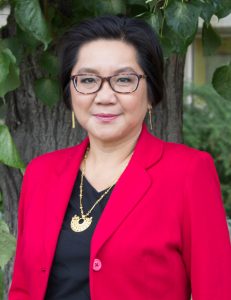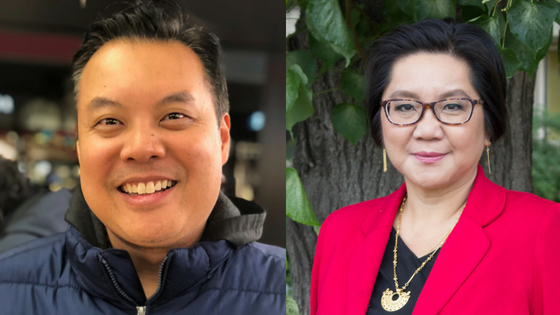Toronto caregiver Ron Beleno knows what it’s like to have a loved one with dementia go missing.
“My dad had Alzheimer’s for ten-plus years. He used to be a wanderer – he’d go on walks, become confused and get lost,” Ron says. “As a caregiver, it’s one of the scariest times. Worst-case scenarios always pop into your head. You know their life could be at risk.”
Ron’s father wasn’t the only one. Wandering is one of the many anticipated symptoms of dementia; it’s commonly cited that three out of five people with dementia will wander from home.[1] For families and caregivers, the disappearance of a loved one with dementia can be devastating.
Motivated by his own experience and those of other families he knows, Ron set out to find a better solution. He teamed up with Dr. Lili Liu, a professor of occupational therapy at the University of Alberta, to create Community ASAP: an alert system that allows first responders to trigger localized notifications to community volunteers when an older adult goes missing.
“When you interview individuals after a person who goes missing is found, either injured or deceased, you find out many members of the community spotted the person but didn’t report it because they didn’t think the person was lost,” Dr. Liu says. “It seemed first responders were not using the biggest resource at their fingertips, which is community citizens.”

Ron Beleno
How it works
When a volunteer signs up for Community ASAP, that individual can select up to five neighbourhoods they usually frequent – for example, those near their home and work. If an older adult goes missing in one of the designated areas the volunteer selected, all volunteers who have signed up to monitor that neighbourhood will receive an immediate alert through email or an app notification with a description of the older adult. Community members are asked to keep an eye out and contact first responders if they come across the individual.
Alerts will be sent out by the designated community coordinator, which, depending on the area, could be the police or an organization such as the local Alzheimer’s Society. In some jurisdictions police already have their own public alert strategies, says Dr. Liu, in which case they would simply integrate Community ASAP into their protocols. The hope is that the service will ultimately lead to shorter searches for missing older adults, which will in turn save first responders time and money.
The alert system, once available to the public, will be free for volunteers. Users will be able to customize their experience by selecting the exact radius of areas they’re willing receive alerts for. By honing in on such a localized level, the founders hope to prevent “alert fatigue” – the desensitization to a constant barrage of alerts.
Community groups, police, businesses, caregivers, and individuals living with dementia alike are eager to get involved, Ron says. And with support from CABHI, the Community ASAP team has been able to mobilize the grassroots-level interest quickly.
The CABHI connection
A member of CABHI’s Seniors’ Advisory Panel – a consumer panel comprised of older adults and caregivers providing input and mentorship to innovators, from the perspective of their lived experience – Ron recommended the Community ASAP team connect with CABHI and gain access to its acceleration services. The Community ASAP team successfully applied to CABHI’s Spark Program, receiving $50,000 to test and validate their early-stage innovation.
“I was just thrilled to hear that CABHI involvement comes with a whole fleet of acceleration services like guidance and consultation related to commercialization, licencing and intellectual property,” Dr. Liu says. “Those are services on top of the financial support which, I think, is brilliant.”
The Community ASAP team is now in the process of testing early versions of the software in simulations with groups of volunteers, caregivers, and police in Calgary, Toronto, and Coquitlam, BC. They’ll be using the feedback from participants in these trials to tweak the system.
CABHI will also be shaping the project’s business model and commercialization plan, as well as the strategy to recruit volunteers.
The plan is for Community ASAP to recruit thousands of subscribers across Canada. In this way, the program will act as an awareness campaign in its own right: a call to action that will educate those who wouldn’t necessarily know about dementia-related wandering.
“We feel that if the community thinks it’s important, and the end-users and people affected by dementia-related wandering see this as important, then through our advertising and publicity campaign, Community ASAP should stick and capture the interest of the general public,” says Dr. Liu.
Though the alert system is still being tested, its founders are looking ahead to how the service could have an even broader impact. Ron is hopeful that in the future Community ASAP will be implemented to help other populations, such as children with autism that go missing. And Dr. Liu’s team is establishing an international research group that will collaborate on how the Community ASAP model may eventually traverse boundaries between countries.
Hope for those living with dementia and their families
The first target group, and the heart of the project, includes families of older adults with dementia and their communities. By harnessing the power of communities, the Community ASAP model has the potential to save the lives of older adults living with dementia – and give caregivers more peace of mind.

Dr. Lili Liu
Sam Noh, a caregiver from Coquitlam, is hopeful about the prospects of Community ASAP. His father Shin Noh, who lived with Alzheimer’s, has been missing since September 2013. “There were confirmed sightings of my father on the day he went missing. Unfortunately, news of my father’s disappearance spread slowly and we received confirmed sightings days after,” Sam says. “It was extremely frustrating chasing sightings of my father that were over a couple of days old. I truly believe if an alerting system such as Community ASAP were in place, my father may have been found.”
Roger Marple is an individual living with dementia from Medicine Hat, Alberta who recently joined the Community ASAP team as a lived experience advisor. He, too, sees tremendous potential in the system.
“I’ve wandered and gotten lost about four times in my life – I even got lost at my job. It’s a dreadful feeling when you’re in a situation like that,” Roger says. “Community ASAP resonated with me personally. I see such a benefit from this program in our communities. It’s different from other programs because it’s so localized. It makes total sense.”


